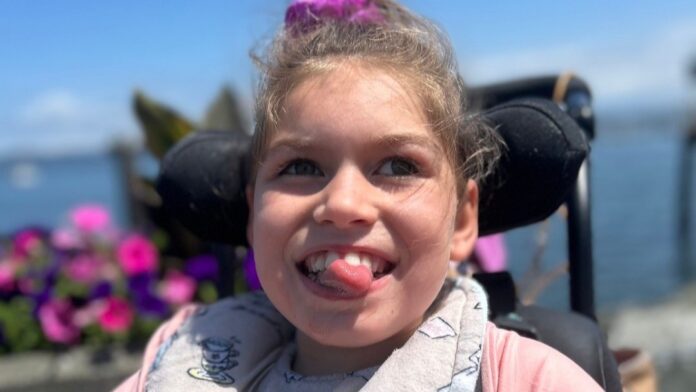B.C. is standing by the decision not to continue drug coverage for a Vancouver Island girl with a rare, fatal disease.
Health Minister Josie Osborne confirmed the decision Friday, following a July 4th meeting with Charleigh Pollock’s parents.
The 9-year-old Langford girl has CLN2 Batten disease, a rare neurodegenerative disorder that causes seizures, blindness and a decline in motor function. Her mother, Jori Fales, has said Charleigh is the only child in British Columbia known to have this form of the disease.
The drug Brineura, which costs more than $800,000 per year, is designed to slow the progression of the disease. However, there is no cure, and most patients with her form of the disease don’t live past age 12.
Fales has said in social media posts documenting her daughter’s journey with the disease that the medication reduced Charleigh’s seizures from nearly 100 per day to none and significantly improved her quality of life.
She said without regular infusions of the drug, her daughter will likely experience irreversible neurological decline.
“This has been an incredibly difficult journey for Charleigh and her family, and my heart goes out to them,” said Osborne.
She said Batten disease patient advocates who were at the meeting earlier this month raised concerns that some information had not been considered by B.C.’s Expensive Drugs for Rare Diseases (EDRD) expert committees or the Canada Drug Agency (CDA) in the decision to end coverage.
Osborne said she also heard concerns that two key international experts in the disease were not engaged by the CDA.
She said Friday “all relevant evidence” provided by the patient advocates had already been considered by the expert committees, and the CDA had reviewed and evaluated publications by the two international experts.
“The EDRD expert committees have not revised their recommendation to discontinue coverage given that there is no clinical evidence it would provide further benefits for Charleigh,” said Osborne.
The ministry decided last year to end coverage for Charleigh’s Brineura treatment as of February 2025. The move was based on a recommendation from the EDRD committee, composed of drug therapy experts and public members.
It said clinical evidence shows Brineura is no longer effective once the disease has progressed to an advanced stage, and does not slow further decline in motor or verbal functioning.
The committee, which operates under the Canadian Drug Agency, found that Charleigh’s condition had deteriorated beyond the threshold for coverage.
Charleigh’s physician disputed the decision, and an extension to June was ultimately granted while the CDA reviewed the research around discontinuation of Brineura.
The health ministry announced what it said was a final decision to end coverage last month after a receiving the CDA’s research review.
The agency’s report found no evidence to justify changing the existing criteria. It also noted that all other jurisdictions covering Brineura follow the same criteria for stopping treatment.
Charleigh’s last treatment covered by the province was on June 19.
“Even if a child in this country meets the current discontinuation criteria, that doesn’t actually reflect whether the drug is working or not and it doesn’t reflect that it isn’t working in that patient,” said Fales in an Instagram post last week.
“In order for Charleigh to get a fair evaluation, to be fairly assessed whether she should be taken off this life-sustaining drug, new criteria are required that takes into account the entire impact this drug is having. Anything less is a failure in our system that will lead to catastrophic outcomes for Charleigh and other children in need.”
Osborne reiterated Friday that the high cost of the medication was not a factor in making the decision of whether or not to continue coverage.
“This has been one of the most challenging issues that I have worked on since becoming Health Minister, and I take seriously my role to ensure that BC has drug review processes that are independent, evidence-based and treat people equally,” she said.
Fales said the family had received enough in donations from the public to cover Charleigh’s next infusion. A GoFundMe set up for Charleigh had surpassed $202,800 as of Friday.
Osborne confirmed the family will be able to use the money to pay for private treatments, adding that Island Health is engaging with the family to help them make arrangements.
Island Health confirmed in a statement to Vista News it was “collaborating with Charleigh’s family and external agencies to determine a path forward for administering a privately funded medication.”
Fales posted a tearful video to Instagram Friday morning, saying the family had received final confirmation from the health ministry that her coverage for her treatments would not be continued.
“Our family is heartbroken and disgusted at the complete disregard of our daughter’s life,” said Fales. “We will never forget or heal from this traumatic situation.”



